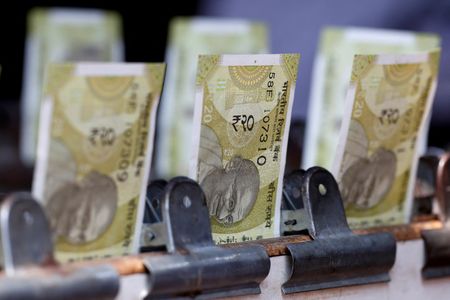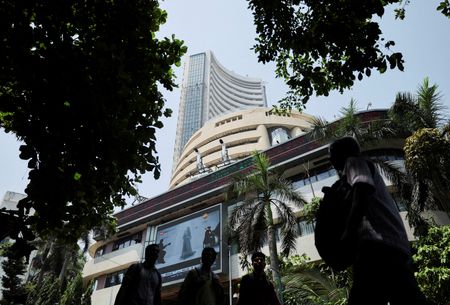By Jayshree P Upadhyay
MUMBAI (Reuters) -U.S. high-frequency trading giant Jane Street, which has been accused of market manipulation by Indian authorities, has deposited $567 million in an escrow account so that it can resume trading in the country.
The Securities and Exchange Board of India (SEBI) barred the firm this month from buying and selling securities in the Indian market and put a freeze on $567 million of its funds. Jane Street was only to be allowed to resume trading if an equivalent amount was deposited in an account that gives the regulator rights over the money until its investigation is complete.
SEBI said in a statement on Monday that the money had been transferred and it was examining the company’s request that restrictions placed on it be lifted.
“The money has been deposited in good faith. The firm continues to contest the order and will send a formal response rebutting the allegations in coming weeks,” said a source with direct knowledge of the matter.
Jane Street did not immediately respond to a Reuters request for comment. It has told its staff it plans to contest SEBI’s allegations and that the practices in question were “basic index arbitrage trading”.
Even with the ban lifted, the tussle with SEBI is expected to have a huge impact on its business in India, which is the world’s biggest derivatives market.
According to a separate source with direct knowledge of the matter, Jane Street does not intend to trade in Indian options while the dispute is unresolved.
Options have been Jane Street’s main line of business in India with its exposure to equity derivatives here roughly five to seven times its exposure to regular stocks, said the first source.
SEBI could send instructions to India’s exchanges to lift the ban sometime this week, said a third source, adding that the bourses will be directed to monitor Jane Street’s trades very closely.
The sources were not authorised to speak to media and declined to be identified.
SEBI has alleged that Jane Street bought large quantities of constituents in India’s Bank Nifty> index in the cash and futures markets to artificially support the index in morning trade, while simultaneously building large short positions in index options which were exercised or allowed to expire later in the day.
The regulator, which tracked Jane Street’s trading patterns for more than two years, has also widened its investigation to include other indexes and exchanges, a source has previously said.
Bourse operator BSE gained 3.2% on Monday on the view that a lifting of the ban could bring more liquidity into the market.
Explosive growth in Indian derivatives trading over the past three years has prompted much consternation among authorities about the fallout for retail investors.
The South Asian country accounted for roughly 60% of the world’s equity derivative trading volume in May, and in the past financial year equity derivative losses for India’s retail traders widened by 41% to 1.06 trillion rupees ($12.3 billion).
($1 = 85.9640 Indian rupees)
(Reporting by Jayshree Upadhyay in Mumbai; Editing by Edwina Gibbs)










